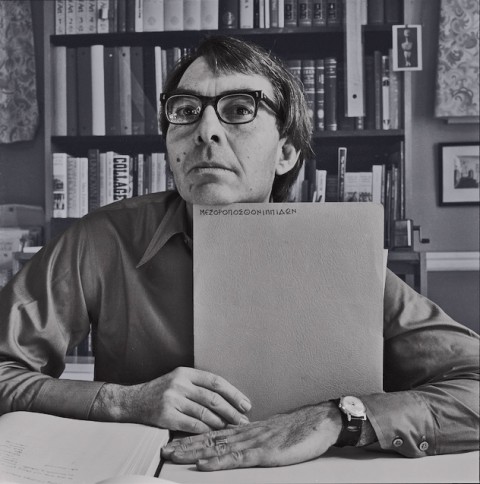
Here, Guy Davenport writes James Laughlin, poet and founder of New Directions Press. He sends Laughlin a drawing of a Laufer, or messenger, and tells him of Ezra Pound’s wishes for the posthumous publication of his Cantos, as discussed at St. Elizabeth’s Hospital (“St. Liz”), where Pound was held for over a decade. Davenport goes on to consider classical theories of physiology, as well as Pound’s own theories.
2 March 1986
Dear Mr. Laughlin:
I’ve just sent you a Laufer. If it won’t do, I’ll try another. This one is from Tassili in the Sahara, where LF was one of the first to erleben. (I have no German of a useful sort, but assume that Erlebte Erdteile means a continent observed.) The conversation in which the Laufer came up (St Liz) involved three things desired—a title for the poem, a “Läufer from Frobenius” under said title and a map of China. I’ve gone through the Kultur Geschichte Afrikas (gift from Ez), the Erlebte, several prehistoric books, and decided that the Läufer must laufen + carry a bow (like Odysseus). A symbol, I guess, of Zweck, the beginning of civilization, the Hunter.
Frobenius knew more about bowstrings than any man ever. Note detail of how the string is doubly tied to the bow in this rock painting. I had to correct for lumpiness of rockface.
Thanks for sharing Wednesday’s class with me. Lucky students. Your “garbage” is better than 98% of the professariat’s best efforts.
Sperm is from brain to testicles in classical physiology. The mind was the lungs (phrenes) where the voice so obviously originates. The brain was a reservoir of oily gunk which lubricated the joints and made a solution for the seed. Ez’s theory is a wonderful mixture of Homeric anatomy and Romantic understanding of a Renaissance supposition about sperm and manliness. Newton attributed his great brain to never having lost a drop of sperm. (The folk belief was, and is, the opposite: that not expending sperm will drive you crazy.) What Gauguin and Vincent had their tearing fight over in Arles was these two theories. Vincent, a Dutch Baptist, believed that his genius depended on his chastity; Gauguin, a pagan, believed that his genius required a visit every day to the whorehouse over that pool-hall.
Taishan, O magister, is in China, as I’m certain you remembered when you got to the bottom of page 6 in class. But these notes are surely headed for archives. Tai is not only a mountain; it is a duke; it was ennobled a thousand years back.
Someone should do a study of Ez’s mountains and hills. Like Joyce’s rivers, they bring things into a webwork of meaning. They come from the Bible (“cities on hills”), from Mediterranean myths (Olympos), from the East, and from the USA, California to New Hampshire.
Last evening was curious. Bonnie Jean had mentioned to a woman at the newspaper that we run a Café Marsupial out back, to feed two opossums named Beeminster and Lucille. Said woman (quite charming) was fascinated, and came to see the feeding of the possums, as well as to work up possums in general (Wallace Stevens, Eliot, Pogo, folklore, etc). She’s a financial and business reporter, which she finds boring, and wants to do more interesting subjects. She’s off to interview a woman who raises possums for the table.
One Nancy Black (who despite her name seems to be French—teaches at Montpelier and is a psychotherapist) has written a study of my ravings, and offers me in study a subject for a future story; viz.
Einstein: “When a mouse looks at the world, the world doesn’t change.”
Neils Bohr: “Yes it does. A little.”
(Obviously talking about Heisenberg.)
Bohr’s one of my favorite people. He loved westerns, and he and his students wore dimestore holsters with lead pistols and wooden bullets at the Atomisk Institutet. When a seminar had gone well, he took everybody to the movies to see Tom Mix or Hoot Gibson, but he could never follow the plot; it took the combined effort of his students to keep him abreast of what was going on.
Another area for deep research: Wittgenstein was a fan of Betty Hutton and Carmen Miranda, and he used to treat his students to their films.
And Piet Mondriaan never missed a Mae West flic; he considered her a lady of great spirituality (geestelijk).
Vanessa: first time I’ve had a name for her. Lots of color in the book, I gather from Leslie.
ad interim,
Guy


